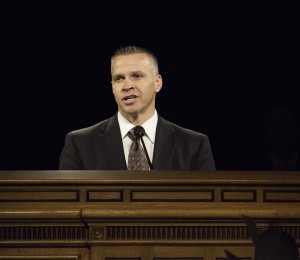Using the Lord’s time scale and measurement system to aid in life’s decisions and trials helps individuals have a better relationship with themselves as well as with Heavenly Father, a BYU professor explained at Tuesday’s campus Devotional.
Shane Reese, professor in the department of statistics at BYU, addressed students at Devotional. He illustrated this using personal experiences and direction from leadership of The Church of Jesus Christ of Latter-day Saints.

According to Reese, his life has not been a perfect example of good measurement. Reese opened with a personal experience illustrating his life’s need for direction. He and his wife faced a decision to take a dream job of his or to stay where they were. After weighing the pros and cons of each situation, both felt that the job opportunity in either place was a tie. Knowing they had to make a decision, they did what any statistician would do — flip a coin.
“While I fully expected my wife to remind me that not everything had to be decided using optimal decision theory, and that this really was one more piece of evidence suggesting that I was as nerdy as my profession suggested I was, I was shocked to hear her say, ‘OK,'” Reese said. “She quickly grabbed a coin from the telephone stand by our back door and flipped it.”
Against all odds, that coin landed directly vertical against a door. Reese and his wife asked their employers for more time to make their decision. They spent that week in much fasting and prayer over the matter. According to Reese, that week was one of the most powerful experiences of their married lives together.
“We had a sweet and precious learning experience that the Lord had in store for us, on His time scale,” Reese said.
Reese taught the importance of personal examination as a means to understanding individual relationships and what the Savior would have each person do.
“Perhaps the most important and difficult measurement we make in mortality is to assess where we stand as individuals,” Reese said. “If we do not take the time to assess where we are in our relationship with the Savior, we will likely find ourselves moving backwards.”
The answers to soul-searching questions give opportunity for individual growth. Reese highlighted spiritual rebirth as a great blessing Heavenly Father gives to his children as they strive to become his.
“The answers to these questions require honest soul searching, personal pondering, sincere prayer and a genuine relationship with the Savior,” Reese said. “They require measurements of ourselves that allow us to take stock of where we stand so that we may make progress towards becoming children of Christ.”
Reese addressed the individual desire to become a better person. Reese said that often people are too hard on themselves and need to be more fair in their measurement of themselves.
“In our quest for perfection, we will almost certainly find that our measurements of ourselves will be found wanting,” Reese said. “Indeed, imperfection in this life is a reality.”
Reese offered President Dieter F. Uchtdorf’s advice on this matter. President Uchtdorf counseled to look inward and understand that each individual is a divine son or daughter of a loving Heavenly Father. Reese understands that keeping this mindset can prove to be difficult in a world filled with increasing forms of technology and media.
“The virtual world that comes with the miracles of technology have a side effect of masking ‘things as they really are,'” Reese said.
Reese said the most effective individual measurement is based on introspective personal interviews, personal pondering and listening to the promptings of the Holy Ghost. This is also important to remember when measuring others.
Reese referred to the Savior’s Sermon on the Mount, reminding those who study those words that no one is perfect and individuals should not judge others harshly. He suggests that more patience is required in measuring others.
“As we move beyond measurements of ourselves to measurement of others, we must exercise caution as measuring others requires the additional virtue of patience,” Reese said.
Reese shared how the help that has come to him in times of need has not always been the type of person he would have expected. One time in particular Reese and his family were stranded in Green River, Utah, due to car troubles.
“Indeed, this giant of a man who wore greasy pants, a dirty flannel shirt and had hands which were rough and scarred from a lifetime of hard work and service literally saved my young family as he allowed us to borrow his car for the evening so my wife and I, with our three children, in car seats, could drive to the next town because there were no tow truck drivers available, and we didn’t have the money to pay them even if they were available,” Reese said.
Reese also explored how those people who seem to be perfect and have it all together may be facing more difficulty than meets the eye.
“Being patient and taking time to make proper measurements of our fellow brothers and sisters before passing judgment is part of what leads us in a path of discipleship rather than other less strait and less narrow paths,” Reese said. “I pray that we will all be a little fairer in our measurements of ourselves and a little more patient in our measurements of others. As we hone our measurement skills, we will be more like our Savior, we will be more effective instruments in his hands and we will understand a measure of his love both for us and for our brothers and sisters.”




